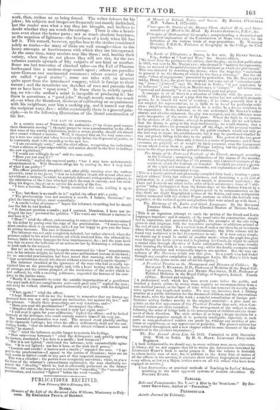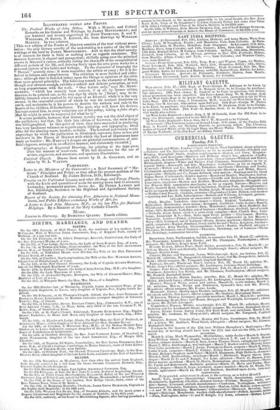PUBLICATIONS RECEIVED,
From February 10th to February 16th.
BOOKS.
Memoirs of the Life of the Rererend John Williams, Missionary to Poly- nesia. By EBENEZER PROUT, Of Halstead. A Memoir of Ireland, Native and Saxon. By DANIEL O'CONNELL M.P. Volume L 1172-1660.
Views upon the Statics of the Human Chest, Animal Heat, and Deter- minations of Blood to the Head. By JULIUS JEFFREYS, F.R.S., &c. Principles of Mathematical Geography ; comprehending a theoretical and practical explanation of the Construction of Maps, with rules for the formation of the various kinds of map-projections. By WILLIAM HUGUES, F.R.G.S., Professor of Geography in the College for Civil Engineers, &c.
The Lords of Ellingliam; a Drama, in five acts. By HENRY SPICER, Esq., Author of " Lost and Won," &c. Second edition. We learn from the preface to this edition, that the play, on its first publication in 1839, was sent to Mr. MACREADY ; who deemed it " unfitted fur representa- tion, on account of the painful nature of the incident on which the plot turned." This was obviated by rewriting the drama; when the tragedian " undertook to present it to the theatre at which he was then performing." But the old story, " close of engagement," prevented its production. On Mr. MACREADY'S taking Drury Lane, the piece was accepted; but some sort of " misunderstand- ing" arose ; "fostered," says Mr. SPICER in Italics, " if not originated, by au influence "-' and " the rest, as Hamlet says, is 'silence.'" All intercourse, " personal and dramatic," is at an end between poet and player. A manager is at all times in a situation of difficulty with the genus irri- tabile. If he plainly says of a play that the writer has not exhibited dramatic genius, he is abused for want of courtesy ; if he states generally that it is not adapted for representation, he is liable to be bored for particular criti- cism ; and Wile ventures upon specifics, he is nailed by a drama rewritten to his suggestions. So far, however, as we can understand Mr. SPICER'S rather obscure and allusive statement, the play was accepted, and the difference arose quite irrespective of the merits of the piece. Where the fault is, we cannot, in the absence of all evidence, attempt to pronounce : but, did we not believe that the drama is going to the dogs irretrievably, we would observe, that a manager who allows his personal temper off the stage, or his personal vanities and prejudices on it, to interfere with his public conduct, would not only go the sure way to injure his establishment, but it may be questioned whether he was not grossly failing in his duty to the public. The patent of the two great theatres is a monopoly, whose only defence is a series of pretences; and if these pretences are palpably set at nought by their possessor, even the transparent excuse which covers them is gone. Perhaps nothing but the public indiffe- rence to the stage preserves the patent's existence.] The Origin of the Fasts and Festivals of the Church, arranged according to the Calendar : comprising explanations of the names of the months, with biographical sketches of the persons, and historical accounts of the events on which the festivals ore founded. To which are added a sketch of the origin and nature of Almanacks, and explanations of their chro- nological and astronomical terms.
[This is a neatly-printed and pleasantly-compiled little book; treating n grave subject without levity but without heaviness, and furnishing a good deal of information in a small compass. Each month is presented separately ; the Fasts and Festivals are taken in the order of their occurrence ; those of " obli- gation " being distinguished from the Saints-days of the Roman Church by a distinct type. In addition to the religious point to be commemorated on the day, there are slight biographical notices of the Saints, and some antiquarian matter connected with the ancient Pagan customs on which the festivals were engrafted, or the national sports and practices that were mixed up with them.] The Harmony of the Latin and Greek Languages. By the Reverend
Tsroxies HILL, A.M., one of the Classical Masters of Mercers School, London.
[This is an ingenious attempt to teach the syntax of the Greek and Latin languages together : and it consists of the usual rules for construction simpli- fied in expression, and presented in English; the examples of the rule being given in each language, with the respective exceptions or additions printed at the end of each section. To a curious tyro, if such a one there be, or to schools where Greek and Latin are taught simultaneously, this little volume will be found very useful—it is in fact two syntaxes in one. If it were not so simple, we should say it would be useful in another mode: when the pupil has gone once through his Latin syntax and is beginning his Greek, he might be carried a second time through the rules of Latin construction, with no more trouble than learning the Greek in a common way, whilst the double examples would excite the attention and reciprocally impress one another. But the very ex- cellence of The Harmony would mar this plan. To a youth who had waded through any complex compilation in pedagogue Latin, Mr. HILL'S little book would seen; like spoon-meat, and offend his dignity.] A Practical Treatise on the ..lIanagement and Diseases of Children. By RICHARD T. EVANSON, M.D., Professor of Medicine in the Royal Col- lege of Surgeons, Ireland, and HENRY MAcNSELL, M.D , Professor of Political Medicine in the Royal College of Surgeons, Ireland. Fourth edition. Revised and enlarged. [ A. professional work which has been seven years before the public, and reached a fourth editioa by steady steps, requires no recommendation grom a non-medical journal, as the lapse of time which has removed its novelty mili- tates against any lengthened notice. We may say, however, that a lifelong practice at a public institution for the diseases of children, and the observations thus made, were the basis of the work ; a careful consultation of foreign pub- lications adding further novelty to the original materials : a plan more re- quisite on the first appearance of the Practical Treatise than now, when Con- tinental writers are more consulted. The arrangement of the subject is clear, following the order of things both in the management of children and the treat- ment of their disorders. The style strikes us as being a happy medium for a medical work—popular enough to be perfectly intelligible, especially in such parts as non-professional readers can profit by, without any sacrifice of pre- cision or explicitness, or any appearance of pedantry. The present edition has been revised throughout, and a new chapter added on some diseases of the skin unnoticed in the previous impressions.] The Neu' Annual Army List, for 1843. Corrected to 29th December 1842. With an Index. By H. G. HART, Lieutenant Forty-ninth Regiment. [ A book indispensable, we should say, to every military man, mess, club-room, or library, did we not suppose that all to whom the information furnished by Lieutenant HART'S book is useful possess it. But the volume is desirable to others beside men of war; for, in addition to the Army List, or names of all the officers in the services, it contains short military biographical notices of every officer, as low as a Major, besides notes on all the others who have been engaged on service.] Class Instruction ; or practical methods of Teaching in Ladies' Schools, according to the most approved systems of modern education. By
RACHEL EVANS. SERIALS.
Bells and Pomegranates, No. V.—" A Blot in the 'Scutcheon." By RO- BERT BROWNING, Author of " Paracelsus."
PERIODICALS.
Asiatic Journal for February.
ILLUSTRATED WORKS AND PRINTS.
The Poetical Works of John Milton. With a Memoir, and Critical Remarks on his Genius and Writings, by JAMES MONTGOMERY; and one hundred and twenty engravings by JOHN THOMPSON, S. and T. WILLIAMS, 0. SMITH, J. LINTON, &c. from drawings by WILLIAM HARVEY. In two volumes. [This new edition of the Poems of MILTON consists of the text without anno- tation : the only literary novelty of the undertaking is a notice of the life and 'writings of the bard by JAMES MONTGOMERY. And in this the chief novelty is of manner, for there is little or nothing new as regards substance. The manner, however, is elegant and panegyrical; skilfully going over the principal events in ItInaori's career, critically noting the character of his composition at different periods of his life, and drawing freely upon his own prose works for a personal picture of his habits and feelings. To the character of biography the sr Memoir " scarcely rises : it more resembles the article or essay ; for it is de- ficient in fulness and completeness. The criticism is more finished and elabo- rate; although that is founded rather upon the likings or opinions of the critic than upon general principles. The following remark on the character of Satan, though now obvious enough, exhibits a refined and delicate perception, as well as long acquaintance with the work. " One feature only," says Mr. Moire- GOHEItY, " which has scarcely been noticed, if at all, by former critics, deserves to be pointed out, as the very sign by which he [ Satan] may be in- fallibly detected when touched by the spear of an Ithuriel; while it is the very means, in the successful exercise of which be won his usurped dominion on earth, and maintains by it his powers to deceive the nations, and rule in the hearts of the children of disobedience. The poet, who well knew his devices, :his represented him, in every voluntary act of his policy, taking a false shape, that he might in none be suspected for what he is." It seems probable, however, that literary novelty was not the chief object of the publishers • but that, like their late edition of COWPER, the main design was bibliographical. In this point of view, they have succeeded in producing -two very handsome volumes as regards paper, binding, and typography, fitted alike for the drawing-room, boudoir, or study. The hundred and twenty wood- 'engravings by which the publication is illustrated, represent those scenes and incidents in the Poems of MILTON with which the host of illustrators have made us familiar : Mr. HARVEY'S designs are pictorial commonplaces, of arti- ficial elegance, arranged in an effective manner, and elaborately executed.] Glyphography; or Engraved Drawing, for printing at the type-press atter the manner of wood-cuts. With full directions for the use of artists, engravers, and amateurs, and specimen illustrations.
Fairford Church. Drawn from nature by H. A. GILLMAN, and on stone by W. L. WALTON.
PAMPHLETS.
letter to the Ministers of the Convocation ; a Brief Summary of " Mo- derate" Principles and Policy, as they affect the present position of the Church of Scotland. By JAMES BRYCE, D.D., Edinburgh.
Treatise on the Cultivated Grasses and other Herbage and Forage Plants, with the kinds and quantities of seeds for sowing down land to alternate husbandry, permanent pasture, lawns, &c. By PETER LAWSON and Son, Edinburgh, Seedsmen to the Highland and Agricultural Society of Scotland.
Report of the Society for obtaining Free Admission to National Monu- ments, and Public Edifices containing Works of Art, 4.c.
A Letter to Lord John Manners, MP., on his late Plea for National Holydays. By a Minister of the Holy Catholic Church.
Music.
Lessens in Harmony. By DOMENICO QUADRI. Fourth edition.



























 Previous page
Previous page